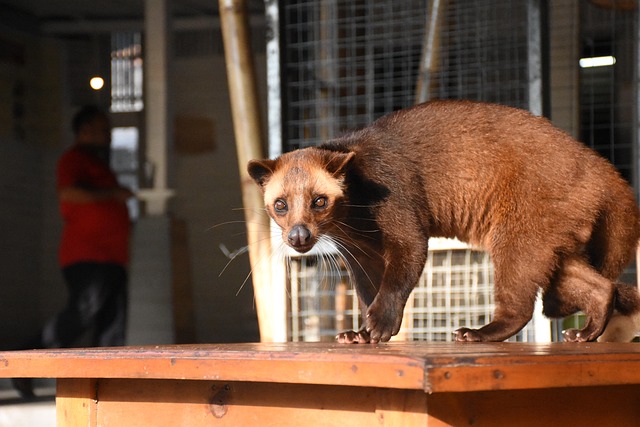In a disturbing revelation, a recent investigation by PETA Asia has shed light on the shocking conditions endured by Asian palm civet cats used in the production of kopi luwak, also known as civet cat poop coffee. The probe, reportedly conducted in 2024, focused on several farms in Java, Indonesia, where investigators allegedly discovered sick animals kept in squalid environments. These conditions have raised alarm bells among animal rights advocates and health experts alike.
As reported, investigators encountered civet cats confined in cramped wire cages encrusted with their own feces. Many of these animals appeared to be suffering from severe health issues, including bloody, open wounds and significant fur loss, indicative of malnourishment and parasitic infections. Footage captured during the investigation reveals a particularly grievous scene: a critically ill civet cat too weak to stand, lying motionless in a filthy cage. Allegedly, the farm owner suggested he wanted to “throw (them) away,” a comment that highlights the perceived low regard for the welfare of these animals.
Investigators also documented alarming behaviors exhibited by the civet cats, including pacing and circling within their enclosures. This behavior, known as zoochosis, is often associated with the immense psychological stress caused by extreme confinement. Many civets, reportedly forced to consume unnatural amounts of coffee cherries, were shown to be suffering mentally and physically—locked away from their natural habitat and subjected to constant human interaction, which they instinctively fear.
PETA Asia claims that the exploitation extends beyond just the civets themselves. The organization has alleged that farmers are illegally housing and feeding binturongs, a species recognized as “vulnerable,” so that their excrement can be fraudulently marketed as civet coffee. This manipulation reportedly serves to increase profits while perpetuating the cycle of cruelty embedded within the kopi luwak industry.
The investigation further emphasized the ethical concerns surrounding the sale of kopi luwak coffee globally. Despite the clear exploitation of civet cats, many businesses continue to support this industry, often mislabeling the coffee as “wild-sourced.” Allegedly, producers have admitted that it is nearly impossible to collect enough wild civet excrement to meet demand, prompting claims that mislabeling is rampant throughout the market.
The health risks associated with consuming kopi luwak coffee are also drawing scrutiny. Civet cats have previously been identified as potential carriers of zoonotic diseases, including SARS and COVID-19, raising questions about public health hazards tied to the industry. PETA Asia warns that the close quarters in which civet cats are kept, combined with their potential sale at live-animal markets, pose significant risks for the spread of diseases.
As this investigation continues to reverberate through the industry, many cafes and retailers are now reassessing their relationship with kopi luwak products. Several businesses have reportedly chosen to discontinue their sale, urged by the outcry from animal rights activists and health advocates alike. However, the challenge remains for those organizations that continue to profit from what PETA describes as a “disgrace.”
The call for awareness and ethical consumerism has never been more urgent. PETA Asia’s findings emphasize the need for tourists and coffee enthusiasts to rethink their choices regarding kopi luwak. As they consider sipping this luxury coffee, the implications for animal welfare and public health hang heavily in the balance. It remains to be seen how these revelations will influence consumer behavior moving forward and whether advocates can successfully persuade companies to sever ties with this controversial industry.

